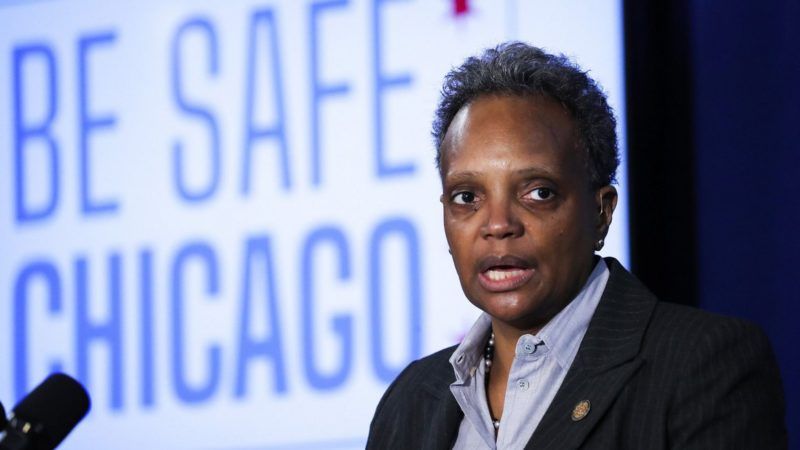Chicago Mayor Lori Lightfoot Doubles Down on Calls for New Law to Seize Property From Suspected Gang Members
Civil liberties advocates say the law is just a reheated version of flawed state anti-gang law.

Chicago Mayor Lori Lightfoot called again Monday for a new ordinance allowing the city to sue gang members and seize their property, despite pushback from civil liberties groups.
In a speech addressing rising violence and crime in Chicago, Lightfoot called for, among other things, the Chicago City Council to pass a "Victims Justice Ordinance" similar to Illinois' Streetgang Terrorism Omnibus Prevention Act. The ordinance would allow the city to file civil lawsuits against suspected gang members, recover damages, and forfeit property connected to alleged gang activity.
"Gangs are violent, dangerous and ruthless," Lightfoot said. "They do not care who they hurt in their quest for money and territory. We need to not just seize their cash, but their assets as well. We need to take away the profit motive by depriving them of blood money, along with locking them up."
Lightfoot tried to distinguish the ordinance from the "rightfully discredited forfeitures of the 1990s," which have been the subject of bipartisan reform efforts across the country over the last decade.
"We will go into court, before a judge with a civil lawsuit where we will have the burden of proving that particular assets—cars, property, businesses—are in fact the proceeds of gang activity," Lightfoot said. "The defendants will be represented and like in any civil case, a judge will determine if we have proved our case. And when we do, we will dedicate a portion of the proceeds to support victims, witnesses, and survivors in Chicago."
Lightfoot first proposed the ordinance in September, but it was roundly criticized by civil rights groups, who say the civil forfeiture law it's based on didn't live up to its promises.
Colleen Connell, executive director of the ACLU of Illinois, said in a statement in September that the Chicago City Council should "quickly reject the Mayor's proposal to use a recycled city version of a harmful state civil asset forfeiture law."
Under civil asset forfeiture, police can seize property suspected of being connected to criminal activity without charging the owner with a crime.
Because such cases are civil, not criminal, the defendants, contrary to Lightfoot's claim, aren't entitled to a lawyer; they bear the cost of going to court to fight for the return of their own property.
"Taking property from people—including innocent family members and others—is not an effective way to reduce gun violence," Connell said. "Similar attempts have been tried in surrounding cities, and the public promises of forfeiture of gang member assets did not materialize."
Illinois attorney John Mauck told local news outlet WTTW earlier this year that the state statute is lightly used and rarely successful at recovering assets. Mauck represented three former Latin Kings gang members who were targeted under the state law. The cases against them were ultimately dismissed after seven years.
Freddy Martinez, executive director of the police accountability nonprofit Lucy Parsons Labs, says Lightfoot's plan "is just another of her administration's poor and narrow-sighted approach to social ills. This is her doubling down on the same failed and racist 'tough-on-crime' policies from the 1980s."
A 2017 analysis by Reason of five years of forfeitures in Chicago found that the city had initiated more than 23,000 seizures for $150 million in cash and property over that period. The data, obtained by Lucy Parsons Labs, showed that, while forfeitures happened all over the city, low-income neighborhoods bore the brunt of asset forfeiture.
Seized property ranged from a cashier's check for 34 cents to a 2010 Rolls Royce Ghost with an estimated value of more than $200,000. Police also seized Xbox controllers, televisions, nunchucks, 12 cans of peas, a pair of rhinestone cufflinks, and a bayonet.
"The research we've provided to Reason shows police are using these perverse incentives to take money from everyone they can get away with," Martinez says. "Despite the rhetoric, the truth is these programs seize, on average, just hundreds of dollars. They're not busting Noriega."
In her speech, Lightfoot said that this year alone the Chicago Police Department and other law enforcement had seized nearly $27 million in cash and $442 million-worth of drugs in the city. "And we need to keep our foot on the gas," she said.
